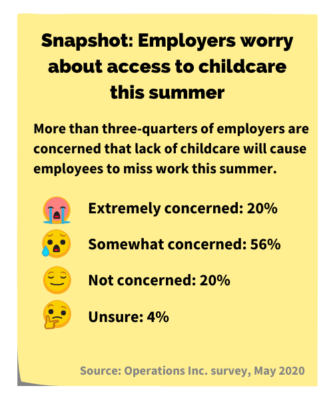Summer is here … let’s just keep working?

Summer is officially here, but many professionals plan to keep their noses to the grindstone, new research from global staffing firm Robert Half shows. Blame the coronavirus pandemic and all the workplace upheaval it has caused.
Factor in that vacation destinations and hotels may not be open or operating at full capacity—plus the public’s reluctance to board commercial aircraft—and there are signs this may be the summer Americans just stay home. The American Automobile Association didn’t even bother publishing its annual summer travel forecast over Memorial Day weekend.
According to Robert Half’s survey of more than 1,000 U.S. office workers:
28% anticipate taking fewer days off in the summer months compared to last year, because of COVID-19; 16% are taking more time off.
37% will save their vacation time for later in the year, hopefully to travel.
14% won’t be logging off because they have too much work to do.
22% would like to take a vacation but are tightening their belts due to the pandemic.
20% will take days off for self-care and mental health.
While 25% of workers reported their employer or manager has encouraged them to take time off since the pandemic began, 66% said there has been no communication about using vacation days. Nine percent revealed they have been discouraged from taking time off from work.
School’s out … but camp is closed.
According to the Department of Labor, paid FMLA leave isn’t available after schools close for the summer, because that’s not a coronavirus-related reason. But, up to 12 weeks of paid FMLA leave may be available, if camps or other programs in which employees’ kids were enrolled didn’t open due to the coronavirus.
DCAP DEDUCTIONS: Employees can change their pretax contributions into dependent care assistance plans midyear to account for day camps not opening (not sleepaway camps), if their cafeteria plans allow midyear changes. If you choose to adopt the IRS’ relief in full, and your DCAP plan allows grace periods, employees have until the end of the year to run out any DCAP expenses. What’s still not allowed: Employees can’t cash out their DCAPs. (Notice 2020-29, IRB 2020-21)
Everything has changed for teens this summer, including jobs
What a difference a year makes. What a difference 30 days makes.
“A month ago, we would have predicted another summer of massive teen hiring,” said Andrew Challenger, senior VP of employment firm Challenger, Gray & Christmas. The summer of 2019 saw 1,737,000 jobs gained by teens, 25% more than in 2018 and the most teen jobs gained since 2001.
This year: crickets. Because of the coronavirus pandemic, total jobs added for teens this summer will probably fall well under 1,000,000. “Everything has changed,” Challenger said.
In 2019, he said, “We had one of the tightest labor markets on record, historically low unemployment and high consumer confidence—the perfect recipe for companies that traditionally hire teen workers, like retail and entertainment venues, to beef up staff.”
A recent Challenger survey found 37% of companies have instituted hiring freezes. Another 11% have implemented permanent layoffs and 49% are likely to in the next three months. Meanwhile, 4% report they are revoking internship offers for the summer, many of which tend to go to older teens.
Traditional sources of teen jobs—restaurants, amusement parks, resorts and municipal parks—have either shut down or sharply curtailed operations. “If we are able to weather this crisis and get businesses back up and running by June, we may see a surge in teen hiring then,” Challenger said. “However, teen workers, as well as any job seeker, may be much more wary of accepting public-facing roles.”







